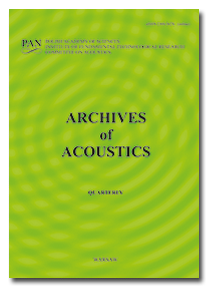Archives of Acoustics,
31, 4(S), pp. 159-163, 2006
Representation of the laser self-mixing effect in an acoustic signal
The goal of the work is to check the possibility of observing the optical phenomena in the
gas laser plasma using a microphone. An RF excited slab-waveguide carbon dioxide laser is
used in the experiment. The investigations are performed on a three mirror resonator structure.
An outside mirror is fixed to a vibration exciter to obtain a returnig wave to the laser resonator.
In that way a self-mixing phenomenon is observed with the optical detector. The response of
the laser plasma changes is detected as an acoustic signal. The results of the investigations can
be useful for controlling the laser tuning.
gas laser plasma using a microphone. An RF excited slab-waveguide carbon dioxide laser is
used in the experiment. The investigations are performed on a three mirror resonator structure.
An outside mirror is fixed to a vibration exciter to obtain a returnig wave to the laser resonator.
In that way a self-mixing phenomenon is observed with the optical detector. The response of
the laser plasma changes is detected as an acoustic signal. The results of the investigations can
be useful for controlling the laser tuning.
Keywords:
CO$_2$ laser, laser plasma, acoustic wave, laser signature, self-mixing.
Full Text:
PDF
Copyright © Polish Academy of Sciences & Institute of Fundamental Technological Research (IPPT PAN).





